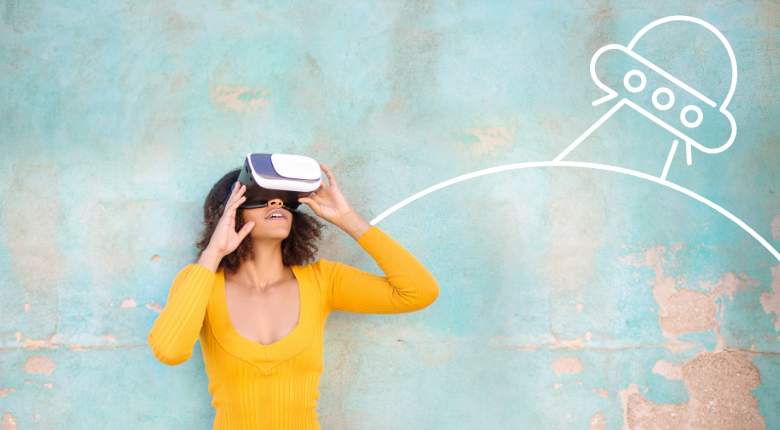Even with such a rich and creative past, it’s easy to get hung up on the future of marketing, isn’t it?
But with technology advancing so quickly - not to mention the continuous pressure to innovate - it’s no wonder marketers find themselves looking ahead.
And the stats don’t lie, either.
According to the MarTech Replacement Survey 2021, 252 out of 374 marketers surveyed switched up their tech stack in the past 12 months. Topping the list was marketing automation solutions, with 24% finding new tech to streamline their processes. On top of that, 51% actually replaced their current marketing tech to improve data management and centralisation as well.
With teams working remotely and cloud management become more prevalent, this trend will only continue through 2022 and beyond.
But there’s another way that data is changing the future of marketing; it’s through blockchain.
Blockchain will beat the bots (and cut out the middleman)
We’ve spoken before about the relationship between blockchain and marketing but as corporations like Google and Facebook tighten their stranglehold around online advertising, there’s now a real opportunity for marketers to cut out the middleman.
Better still, while online advertisers duke it out for our attention - offering nothing in return for these intrusive and relentless popups - blockchain can actually reward us for tuning in.
As a matter of fact, it’s already happening.
Based on blockchain technology, Brave Browser offers incentives for searching the internet. And although being served advertisements is optional, users will be compensated with ‘Basic Attention Tokens’ if they choose to do so. In turn, these can be exchanged for real money - nice.
But this isn’t the only way that crypto technology is transforming the future of marketing.
Boosto is innovating the ways in which influencer marketing works, too. This decentralised system rewards content creators and audiences without the need for any third-party intervention.
Crucially, these tools give brands and their audiences the ability to work and engage with each other both safely and independently - a real game-changer.
And as blockchain allows users to create their own ‘sovereign identities’, enabling them to buy, sell and be identified online without data capture, their digital persona doesn’t have to be defined by what social account they use anymore.
Simply put: it’s owned by them - and no one else.
“Blockchain is not simply a new technology. It is a new cultural artefact, one that represents the mindset of humanity's first generation of digital natives,” says the team at Business Insider in ‘Blockchain is the future of transactions, and here's how it will change marketing’.
And maybe it’s because, as marketers, we’re already part of a networked, global community that blockchain feels like a natural progression.
“Centralized systems run counter-intuitive to the way this generation sees the world, and this is why Blockchain is so important. It is laying down the ground rules for how transactions will happen in the future,” argues the team at Business Insider.
But these ground rules are not limited; blockchain can offer marketers creative opportunities far beyond advertising too.
Next year and onwards, non-fungible tokens (NFTs) are likely to become a popular way for brands to incentivise and reward their followers. With everything from virtual trading cards to online ‘loot boxes’, many influential brands like Coca Cola and Team GB are already experimenting with the medium.
And NFTs aren’t the only tool that brands will use to bond with their customers next year.

Never miss an update from us.
Get monthly doses of brand, marketing and tech delivered directly to your inbox!
Over the influence - taking a more personal approach with tech
In a society that feels more divided than ever within its online spaces, creating meaningful connections will become a top priority for brands.
And social will play a crucial part in this strategy.
In fact, when Sprout Social surveyed 1,000 consumers, they found that 91% of people believe in social’s power to connect people - despite feelings of division. More specifically, 78% of consumers want brands to use social to help people connect with each other.
Reassuringly, brands have been taking note.
This year, Shutterstock introduced Newsroom by Shutterstock, connecting users to breaking news from journalists, videographers, and photographers twenty-four hours a day. What’s more, the company’s YouTube channel includes an artist series that showcases the portfolios of Shutterstock contributors - helping them get more work in the process.
And this part seems obvious but it’s true: brands will continue to find success if they gravitate towards the platforms their users are native on.
For example, e.l.f Cosmetics recently developed its own song: ‘Eye, Lips, Face’ and used it as the foundation for a TikTok campaign; a platform their target demographic uses regularly.
The results were staggering.
According to Nielson InfluenceScipe, it had 1 billion views in just six days, was the first piece of branded content to hit No. 1 on TikTok’s organic trends list. It now has more than 6 billion views to date and 5 million+ user-generated videos as part of the campaign’s associated challenge.
“TikTok’s success is symptomatic of a real desire to wash away the filters of ‘influencer’ and indulge in a more pure and ‘real’ form of entertainment,” says Ross Farquhar, marketing director at mochi ice cream brand Little Moons for Marketing Week.
But it’s not just social that’ll help brands innovate with campaigns and resonate with audiences; in terms of the future of marketing, AR’s the new frontier.
Augmented realities and marketing inside the Metaverse
In the 2011 novel Snow Crash, Neal Stephenson first coined the phrase ‘Metaverse’. The author used it to describe his expansive cyberspace - one full of avatars and software daemons.
But in a time when the real world’s feeling more dystopian than sci-fi, brands like Facebook are working to make the Metaverse a reality. One we choose to exist in over the real thing.
Sound a bit far-fetched? Well, if you think about it, It’s already happening.
“The pandemic in particular saw many of us escape reality into online worlds like Roblox and Fortnite. But these spaces have proven to be a place where human creativity can flourish amid crisis,” says Nick Pringle, SVP executive creative director of the innovation consultancy R/GA London in an article for Fast Company.
But this isn’t limited to individuals alone; brands are jumping on the virtual bandwagon, too.
Crypto platform Boson Protocol paid $700,000 for a plot of virtual real estate in Decentraland where they’ve now ‘built’ a shopping mall; the same place where online shoppers can find an AR casino by Atari.
That’s all fair and well for the tech-savvy blockchain and computer game devs. But what about everyday brands?
Well, they’re getting involved too.
Pinterest has now pivoted its marketing tactics to embrace AR. This year, the organisation announced an augmented reality shopping feature that allows users to virtually try on eyeshadow from the likes of YSL, Urban Decay, Lancome and NYX Cosmetics before buying.
If the Metaverse really does become a thing, brands won’t be content to advertise on social media platforms anymore; they’ll be targeting their audiences inside them, too.
But we’re not the only ones that are learning new ways of working...
Lean on learning tools to give campaigns a leg up
We’ve spoken before about advertising going AI. But as we move into 2022 and beyond, machine learning is only going to become more commonplace.
Jeremy Fain, CEO and Co-Founder of Cognitiv, argues that deep learning is the one digital trend that businesses must adopt above all others. He reckons this powerful tech will give organisations unparalleled insights and a true competitive edge. Here’s how:
- Deep learning tech examines data around the behaviour and traits of your customers and identifies similar people in the population.
- It then uses those insights to optimise campaigns in real-time, maximising the impact of your media buys.
- Each outcome is fed back into the deep learning algorithm so that it can learn from its mistakes and become more effective over time.
- Finally, the solution focuses on incrementality; this is customers who were converted as a result of your advertising. Therefore, it avoids needless advertising to existing customers.
“Being able to lean on technology, especially sophisticated technology such as deep learning, is an incredibly valuable advantage because it enables marketers to take out the guesswork and focus on the areas — and people — who will produce results,” he said in ‘Tech-Savvy Marketing: How To Stay Ahead Of The Curve’.
But when it comes to the future of marketing - and with technology advancing at such a rate - where it goes in the next few years is still anybody’s best guess.
However, with deep learning and the Metaverse now having real-world implications, visions of the ‘Matrix’ or those intelligent machines from the movies no longer feel quite so fantastical.
And wherever we end up, one thing’s for sure: we might not be able to change the past - but it’s fun getting hung up on tomorrow.



